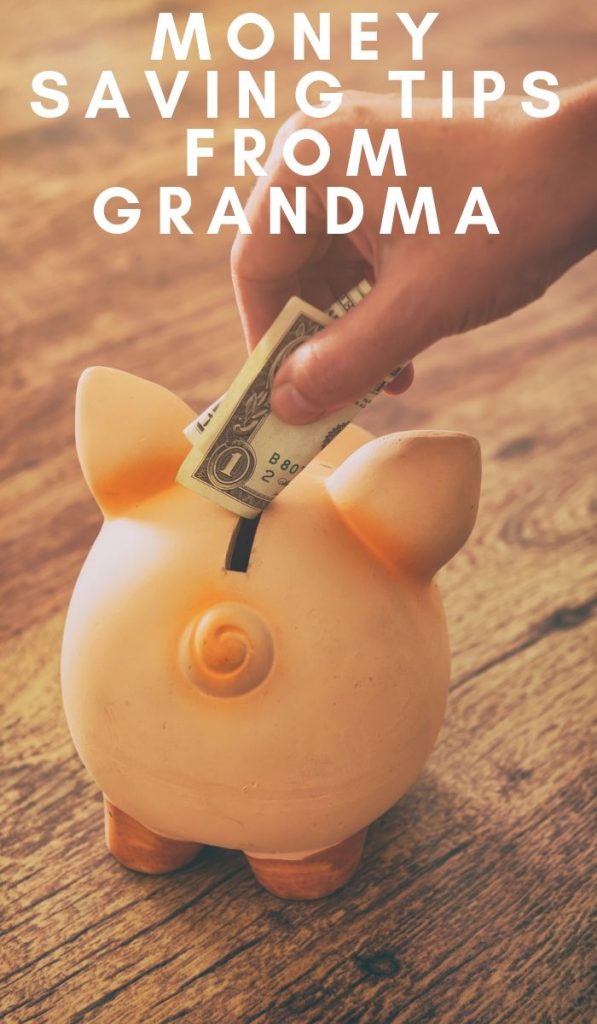I'm sure you've heard the saying, ” necessity is the mother of invention .” Well, when it comes to being frugal, my grandma was a pioneer. She had to be resourceful due to limited financial resources during the Great Depression era. And because of that, she taught me some valuable money-saving tips that I still use today. Grandma’s frugal money-saving tips could fill a book by themselves, but there have always been a few that stuck out in my head as I’ve gone through life. Here are some of her best ones.

9 Frugal Money Saving Tips My Grandma Taught Me
Most of these seem as if they would be common sense frugal money-saving tips. The truth is that we can get so caught up in our lives that we forget even the simplest of things. It is always helpful to have a reminder.
Most of these will help you cut your expenses enough that you can use that money to build your emergency fund or to pad your savings account with the money you’ll save!
Related: Money Saving Books Everyone Should Read
Use it up
How many times have you thrown out produce or meat that has gone bad because it sat in the fridge for too long? How about snacks and other pantry items that have gone stale? If your answer is more often than you should, you’re literally tossing money into the trash can.
Instead of allowing things to go to waste, make certain that you use them up before they get to the point that they will go bad. This doesn’t just apply to food, but things like shampoo, kids' bath items, toilet paper, and more.
Related: 88 Great Depression Recipes
Make Do with What You Have
Do you really need to run to the store to pick up that one item for your recipe or will it taste just fine without it? Chances are good that it will be fine without it and you will save money by not going to the store.
The reason behind this particular money-saving tip is that you spend more when you’re in the store. Even if you only intended to pick up one item, you very likely will buy more when you go to the store. Impulse buys make up a huge percentage of money that grocery and other stores make each year.
If you force yourself to make do with what you have instead of buying more items, you’ll save thousands each year without even realizing that you’re doing anything to save.
Related: 13 Items They Made During the Great Depression (But We Pay for Now)
Keep Your Home and Car Maintained
A car or home that isn’t maintained correctly ends up being one thing; a money pit. Once one or two things go wrong, they seem to fall apart, and it becomes one thing after another struggle that only gets more and more expensive as time passes.
Instead, keep them both well maintained, and you will save money in the long run. Picking up a home maintenance book and a car maintenance tracker can help you keep track of when you repaired or replaced what.
Related: 22 Frugal Living Tips from the Great Depression
Never be Brand Loyal
Being brand loyal or buying only one specific brand of something is a great way to waste money. A large portion of generic items is made by the same companies that make the more expensive products.
The only differences are the labels involved and the cost. By purchasing other brands when they’re on sale or generic when they’re not, you can save yourself thousands per year depending on how often you shop.
Related: 10 Old Fashioned Money Saving Tips You Need to Try NOW
Stay Organized
Being unorganized is a fantastic way to waste money, but it is one that we don’t usually connect to waste. Late bill payments because you forgot, misplaced tax receipts, and more can all cost you hundreds (or more) each year in wasted money.
To stay organized better, get yourself a tax planner and a day planner to keep important papers and important dates in.
Related: Great Depression Cooking Tips That Will Save You Money
Use Cash Only
Cash is king. Using cash only is one of the simplest ways to save money that my Grandma taught me. When you use credit, you usually pay high-interest fees, high late fees, and sometimes even a per-transaction charge. Not only that, but spending cash has a calming effect on those who have a hard time not spending. When you physically see that you only have a certain amount, you are less likely to go overboard.
Using an envelope system budget is a great way to manage a cash-only budget. You can either use regular envelopes or you can purchase an actual envelope system to help you stay organized.
Related: 10 Money-Saving Tips from the Amish Lifestyle
Choose quality over quantity
It can be tempting to buy cheap items. They are cheap after all but cheap doesn’t always refer to price only. It also refers to how they’re made. An item that is made cheaply doesn’t last and what happens when it doesn’t last? You must replace it.
If you will spend more money replacing an item than you would be buying a more expensive option, it is always best to buy the more expensive one.
Related: 35 Uses for Fels Naptha Soap That Will Change Your Life & Your Budget!
Barter and Trade when possible
Bartering and trading have gone out of style in recent years, but it is still a great frugal money-saving tip. If you can get something for free, for an item you no longer need or want, or for a small bit of time, why would you opt to pay for it?
Related: 5 Steps to Become a Bartering Queen (or King!)
You can barter any item that your trading partner is willing to barter! Items that you no longer need, baby-sitting services, laundry or house cleaning services, grocery shopping services, and more are all common things to barter.
Do you have any tips frugal money-saving tips your grandma shared with you? I'd love to hear them, let me know in the comments below.
